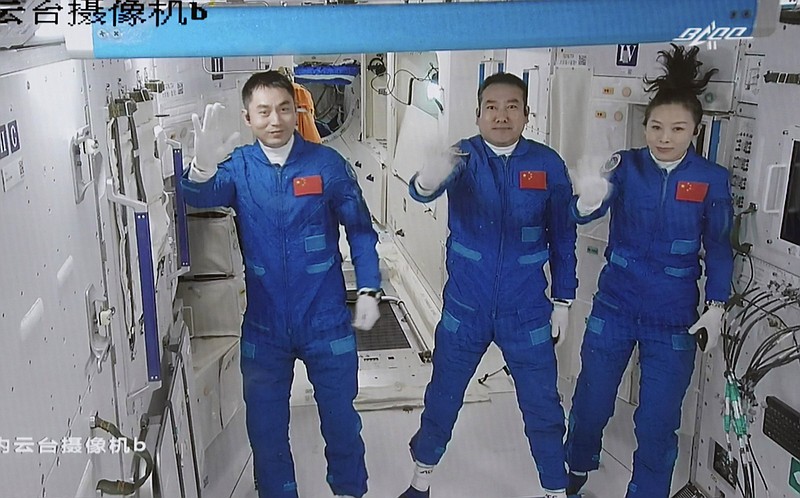BEIJING -- Chinese astronauts began Saturday their six-month mission on China's first permanent space station, after successfully docking aboard their spacecraft.
The astronauts, two men and a woman, were seen floating around the module before speaking via a live-streamed video.
The new crew includes Wang Yaping, 41, who is the first Chinese woman to board the Tiangong space station and is expected to become China's first female spacewalker.
[Video not showing up above? Click here to watch » arkansasonline.com/1017taikonauts/]
"We'll cooperate with each other, carefully conduct maneuvers, and try to accomplish all tasks successfully in this round of exploration of the universe," said Wang in the video.
The space travelers' Shenzhou-13 spacecraft was launched by a Long March-2F rocket at 12:23 a.m. Saturday and docked with the Tianhe core module of the space station at 6:56 a.m.
The three astronauts entered the station's core module about 10 a.m., the China Manned Space Agency reported.
They are the second crew to move into China's Tiangong space station, which was launched in April. The first crew stayed three months.
The new crew includes two veterans of space travel -- Zhai Zhigang, 55, and Wang. The third member, Ye Guangfu, 41, is making his first trip to space.
The mission's launch was seen off by a military band and supporters singing "Ode to the Motherland," underscoring national pride in the space program, which has advanced rapidly in recent years.
The crew will do three spacewalks to install equipment in preparation for expanding the station, assess living conditions in the Tianhe module and conduct experiments in space medicine and other fields.
China's military-run space program plans to send multiple crews to the station over the next two years to make it fully functional.
When completed with the addition of two more sections -- named Mengtian and Wentian -- the station will weigh about 66 tons, much smaller than the International Space Station, which launched its first module in 1998 and weighs around 450 tons.
Two more Chinese modules are to be launched before the end of next year during the stay of the yet-to-be-named Shenzhou-14 crew.
China's Foreign Ministry renewed its commitment Friday to cooperate with other nations in the peaceful use of space.
Spokesperson Zhao Lijian said sending humans into space was a "common cause of mankind." China would "continue to extend the depth and breadth of international cooperation and exchanges" in crewed spaceflight and "make positive contributions to the exploration of the mysteries of the universe," he said.
China was excluded from the International Space Station largely because of U.S. objections over the Chinese program's secretive nature and close military ties, prompting it to launch two experimental modules before starting on the permanent station.
U.S. law requires congressional approval for contact between the American and Chinese space programs, but China is cooperating with space experts from other countries including France, Sweden, Russia and Italy.
